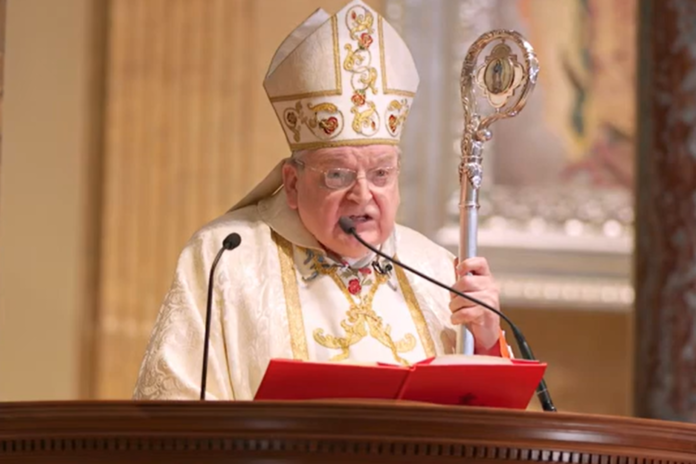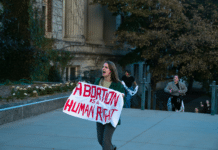In a detailed and forceful statement on the sacredness of Holy Communion, Cardinal Raymond Burke said pro-abortion Catholic politicians who “publicly and obstinately” reject the Church’s teaching on abortion are in a state of apostasy and automatically incur the “penalty of excommunication.”
The doctor of canon law began his April 7 statement by providing a brief overview of the Catholic Church’s teaching on the Holy Eucharist.
“Regarding the Holy Eucharist, the Church has always believed and taught that the Sacred Host is the Body, Blood, Soul and Divinity of Christ, God-the-Son Incarnate,” he said.
Burke said he has received countless questions from Catholics and non-Catholics who are “frequently scandalized by the all too common public betrayal of the Church’s teaching on faith and morals by those who profess to be Catholic.”
“In particular, they ask how Catholic politicians and civil officials who publicly and obstinately defend and promote the practice of abortion on demand can approach to receive Holy Communion,” said the cardinal.
Without mentioning him by name, Burke said pro-abortion Catholic politicians like President Joe Biden commit a “particularly grave form of sacrilege” when they receive Holy Communion.
“It not only merits eternal punishment for the one who receives unworthily but constitutes a most serious scandal for others, that is, it leads them into the false belief that one can publicly and obstinately violate the moral law in a grave matter and still receive Our Lord in Holy Communion,” Burke continued.
In his first days in office, President Biden signed an executive order rescinding the Mexico City Policy, which prohibits foreign organizations that promote or provide abortions from receiving American taxpayer dollars.
Archbishop Joseph Naumann of Kansas City in Kansas, the chairman of the U.S. Conference of Catholic Bishops’ Committee on Pro-Life Activities, said Biden’s “soul is in jeopardy” in response.
Burke responded to critics who argue that the denial of Holy Communion to pro-abortion Catholic politicians “is the use of Holy Communion by the Church for political purposes.”
“On the contrary, it is the Church’s solemn responsibility to safeguard the holiness of the Holy Eucharist, to prevent the faithful from committing sacrilege, and to prevent scandal among the faithful and other persons of good will,” said Burke.
“It is rather the Catholic politician, who publicly and obstinately promotes what is contrary to the moral law and yet dares to receive sacrilegiously Holy Communion, who uses the Holy Eucharist for political purposes. In other words, the politician presents himself or herself as a devout Catholic, while the truth is completely otherwise,” he added.
The Catholic prelate then discussed the “question of the imposition or declaration of a just ecclesiastical penalty for the sake of calling the person to conversion and of repairing the scandal which his or her actions cause.”
“Those who publicly and obstinately violate the moral law are, at least, in a state of apostasy, that is, they have effectively abandoned the faith by the obstinate refusal, in practice, to live in accord with fundamental truths of faith and morals. An apostate from the faith incurs automatically the penalty of excommunication. The Bishop of such a person must verify the conditions for the declaration of the penalty of excommunication, which has been automatically incurred,” Burke declared.
He said pro-abortion Catholic politicians may also “be in heresy” if they deny the intrinsic evil of abortion.
“Heresy, like apostasy, incurs automatically the penalty of excommunication. Also, in the case of heresy, the Bishop must verify the conditions for the declaration of the penalty of excommunication, which has been automatically incurred,” he said.
Burke concluded his statement by affirming the Church’s teaching on the “necessary disposition of conscience for the reception of Holy Communion.”
“The answer to the question so frequently posed to me is clear: a Catholic who publicly and obstinately opposes the truth regarding faith and morals may not present himself or herself to receive Holy Communion and neither may the minister of Holy Communion give him or her the Sacrament.”


















